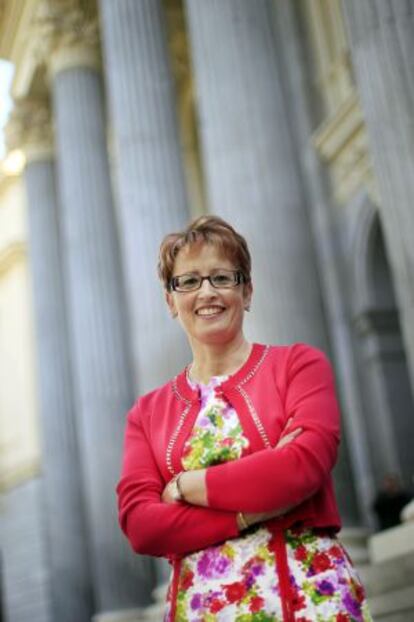“Just like drugs and sex, we have to educate children about money”
María Jesús Soto has written a book that will give youngsters a grounding in finance

"I know what it's like to fight against the system for two decades. It is really, really tough," says María Jesús Soto. In a country where the finance industry has never made it a priority to give their clients an economic education, María Jesús Soto is a rare bird indeed. A branch office director for Inversis Banco in the city of León, her résumé features extensive expertise in the capital markets, including a job with Morgan Stanley.
But her real passion is education - more specifically, financial education. She has her own program on León's local television station, a website, and a busy diary filled with lectures. Her latest project - though surely not the last, as her mind is always bubbling with ideas - is a how-to book aimed at children, called Mi primer libro de economía, ahorro e inversión (or, My first book of economics, savings and investment)
"Spain has had a tremendous deficit when it comes to understanding basic financial principles," she declares early on in the conversation, which took place on a terrace café overlooking the Madrid stock market. Soto, who speaks with an infectious energy, says we shouldn't be afraid to talk about money with kids.
"Nobody can turn their back on money. Just like we educate and warn children about drugs and sex, we have the obligation to talk naturally about money. Having said that, we need to train children in values, since without them money becomes a dangerous weapon. Euros should be earned and spent honestly, but you need a minimum knowledge to start with."
She decided to write the guide in comic book format to attract kids to a subject that may seem somewhat dry at first. It talks about inflation, savings, the stock market and the different types of assets there are. Soto fully supports a financial education plan that's being sponsored by the Bank of Spain and Spain's market watchdog, the CNMV. But she believes that the real key would be to include financial learning as a mandatory subject matter in schools.
The Inversis Banco branch director has also worked for Morgan Stanley
"When I visit schools, I realize that students' self-esteem improves notably when they are able to understand a few basic financial concepts," she explains.
When a system that sells financial products is in the hands of banks, and prospective clients are poorly educated in basic economic concepts, the result is a higher probability of situations like the preferential share fiasco in Spain, where thousands of bank customers bought bank shares on the promise of high yields without fully realizing the risk involved. Following the collapse of the savings banks, many clients lost most of their initial investment.
Learning how the markets work will also be essential at a time when the sustainability of the welfare state is being questioned. "When today's kids retire, they will get minimum pensions. So they need to know how to generate wealth, save it and make it grow," she says.
An optimist by nature, Soto asserts that "this generation, the children of the crisis, are going to be very strong. They aren't afraid of anything. It's the adults who need to rise to the occasion and give them what they need: training and values."
Tu suscripción se está usando en otro dispositivo
¿Quieres añadir otro usuario a tu suscripción?
Si continúas leyendo en este dispositivo, no se podrá leer en el otro.
FlechaTu suscripción se está usando en otro dispositivo y solo puedes acceder a EL PAÍS desde un dispositivo a la vez.
Si quieres compartir tu cuenta, cambia tu suscripción a la modalidad Premium, así podrás añadir otro usuario. Cada uno accederá con su propia cuenta de email, lo que os permitirá personalizar vuestra experiencia en EL PAÍS.
¿Tienes una suscripción de empresa? Accede aquí para contratar más cuentas.
En el caso de no saber quién está usando tu cuenta, te recomendamos cambiar tu contraseña aquí.
Si decides continuar compartiendo tu cuenta, este mensaje se mostrará en tu dispositivo y en el de la otra persona que está usando tu cuenta de forma indefinida, afectando a tu experiencia de lectura. Puedes consultar aquí los términos y condiciones de la suscripción digital.









































